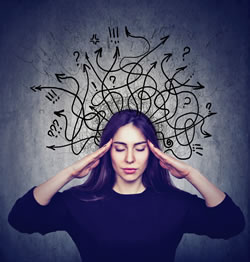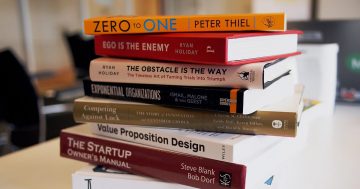Claire Marshall* discusses how ADHD has impacted her career and the four strategies that helped her turn it into her ‘secret weapon’.
 Late last year, I was given the gift, relief and grief of a diagnosis for my chaotic brain. Like many women, I discovered that I had ADHD only after my own child was diagnosed.
Late last year, I was given the gift, relief and grief of a diagnosis for my chaotic brain. Like many women, I discovered that I had ADHD only after my own child was diagnosed.
The response from the people I love was both over and underwhelming: ‘Oh, of course’ so many of them said. ‘That makes perfect sense’.
And it does.
I have always struggled in some way.
The way I live has a headwind of turmoil- from my finances and physical things (forever being lost) to my train of thought and emotions (forever being hijacked), chaos has been a constant and I always thought it was a symptom of a great layer cake of character flaws I held.
When I saw my daughter begin to manifest the way my head works- forgetting midway through tying shoes what she was doing, crumbling at an unkind or ill-thought comment, becoming so worked up she couldn’t sit still, being trapped in the vortex of her head to the point where a shout couldn’t rouse her – I was terrified.
One of my earliest wishes of motherhood was that they would not become like me.
I’m no unicorn. Most women with ADHD remain undiagnosed as children, an oversight abetted by a deeply gendered stereotype of ADHD that focusses on its physical symptoms.
Many women with ADHD have comorbidities including substance abuse, eating disorders, anxiety, depression, and insomnia as well as the symptoms of ADHD that are often masked or heavily internalised at the point of adulthood.
Since I was diagnosed and talked about it publicly on the Good Sheilas podcast, I’ve been struck by how many women have come forward and shared their own late diagnosis or have been drawn to seek out help.
The narrative amongst us is amazingly consistent: we had no idea, and yet it makes the puzzle of our brains fall into place.
Over the last seven years, I’ve had two children.
I have been promoted in a succession of roles from a paralegal fresh out of law school to an Executive.
I’ve navigated a separation. And somehow, my chaotic brain has carried me through.
I wonder if the busyness has been a protective gauze- as if running from the reality of how much of a mess everything was kept the reality of it at arms-length.
Unbeknownst to me, as my career continued to accelerate, I was developing coping mechanisms and strategies to not only manage my ADHD in the workplace but utilise the useful bits.
The workplace is a strange place to not be neurotypical.
The rigour, formality and deadlines of the modern office sit at odds with the rapid distractibility of an ADHD brain.
So what can help?
The four strategies below I developed unknowingly, before I had the language and understanding gifted via my diagnosis.
They don’t look like your typical professional tips because my brain isn’t typical.
They’ve helped me not only navigate the professional world: they have allowed me to succeed, despite and (perhaps, magically) because of the ways my brain is different.
Know your weaknesses and use them
Detail is my of my deepest foibles.
If I write anything, particularly if it’s technical or complicated, it’s going to have mistakes.
I struggle to identify them, and I struggle more to build the impetus to look for them.
But I know they’re there, and I know that it’s a blue moon if something I’ve drafted is error-free.
Being frank and forthcoming about what you’re not good at is a strength, and it forces you to draw focus on areas that need it.
Where I can, I always get another set of eyes on my work.
If I can’t, I do a last-minute re-read after I’ve completely segued my brain onto something else and relook with fresh eyes at my inevitable multitude of errors.
I’ve got a hefty picnic basketful of weakness: I struggle to focus at meetings (particularly online ones, thanks COVID).
Weakness fixer: I always take notes, even (and especially) when I don’t need to, and the connection of the conversation to writing helps to solidify the topic in my brain.
I often need to move or I can’t focus my brain.
Weakness fixer: I stand up, have objects at my desk (a pile of rocks I like that my best mate roasts me for) to fiddle with, and sit at different locations as much as I can.
There are workarounds to everything, and the franker and more fearless you are with where you fall short, the easier life is.
Slow. Down.
ADHD brains love to rush.
My brain is the most content when it is a deluge of things- a stream of consciousness cascade of discombobulated thoughts, ideas, conversations and content.
I’ve got hundreds of tabs open on my phone and loads more in my head.
This isn’t ideal for the workplace, particularly when your work is high risk, detailed or analytical.
Meditation is indispensable for helping to slow down.
It’s taught me so many invaluable things: things that seem unextraordinary but are game-changing, including the concept that we are not our thoughts and that our physiological selves have clear and controllable connections to our emotional states.
Just regulating our breathing and focussing on our bodies can help to centre a fast mind.
If you’re new to meditation, the Headspace app is excellent, or just try sitting calmly for five minutes and focussing on your breathing, and thinking about what you can hear, and what your body feels like from head to toe as the weight of it presses down on the chair.
The act of slowing down our breath slows our bodies, too, and our brain.
Take a moment to connect with your breath before you start doing anything that needs you to focus.
Speed. Up.
People with ADHD are incredibly distractable and easily bored.
Anything mildly interesting (or utterly not) can segue your brain into a thunderstorm of irrepressible thought.
We’re also great procrastinators, but there is a magic power: Hyper-focus.
It’s that panicked, sharp detail attention that only happens if you’re ridiculously engaged in a task (irregular and usually useless, hello, my encyclopaedic knowledge of the Star Wars non-humanoid aliens thanks to Wookiepedia) or if it is absolutely the last minute and something must happen NOW.
I used to struggle with it and try and balance my work into digestible bits but my brain doesn’t like to (and sometimes outright refuses) to work that way.
Now, I embrace it, especially on the bad days.
This doesn’t mean I don’t feel guilty and mildly incompetent starting a complex task at 4 am the day that it’s due, but I understand now that when a piece of work is evading my concentration that I can do it at the very last minute and enjoy the intense concentrated rush of hyper-focus.
Taking things to heart
ADHD makes me sensitive.
The mildest of comments or criticisms trigger a response called rejection sensitivity dysphoria, which is a cognitive state where rejection (whether real or perceived) becomes an intense and inescapable physical experience that you struggle to rationalise out of.
Rejection sensitivity dysphoria is a mood disorder that is experienced by many people with ADHD, with a significant proportion of sufferers reporting that it is the hardest symptom that they navigate.
I have really struggled with it in the workplace, and have been hypersensitive to feedback, perceived slights and passive aggressive behaviours.
At times, it’s made me more focussed on being liked than being a good leader, which is not a productive position and falls short of what people need from their supervisors.
Combining this with rejection sensitivity dysphoria is a combustion cocktail for ADHD.
This one has been the hardest to counter in the workplace and has taken consistent work to manage.
I have emphasised to myself that a good leader gives constructive feedback, holds consistent boundaries and sets fair and rigorous standards, factors that may give way to colleagues ‘disliking’ you.
Small mantras help in the office when situations become challenging: ‘I am a strong, fair, consistent leader who treats others kindly’ is a useful mantra to chant when workplaces get complicated.
Holding worries for a specific time of day also helps as a form of emotional compartmentalisation.
That can look like, ‘I’ve gotten difficult feedback, and I’m going to process and reflect on that at 4:30. Before then, I’ll focus on other things’.
Finally, forgive yourself.
We are all vulnerable, complex, emotional beings.
We encounter and experience things differently.
If something takes you by surprise by the depth of its emotional impact on you, that’s ok.
Give yourself a moment- you are the best carer for you.
ADHD has been my chaotic sidekick throughout my career, and I am grateful for the empathy and creativity it drives as well as understanding of the challenges it has created for me.
We all navigate difference, and I’ve only recently developed the knowledge to understand and celebrate my own.
Strong and authentic leadership requires you to have confidence in your abilities and- perhaps more importantly- be open and unashamed of where you are different.
Often strengths flourish there, too.
*Claire Marshall is a human rights lawyer and NFP Executive who specialises in systemic reform within the justice system and violence against women and children.
This article first appeared at womensagenda.com.au.











